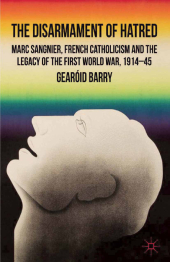 Neuerscheinungen 2012Stand: 2020-01-07 |
Schnellsuche
ISBN/Stichwort/Autor
|
Herderstraße 10
10625 Berlin
Tel.: 030 315 714 16
Fax 030 315 714 14
info@buchspektrum.de |

G. Barry
The Disarmament of Hatred
Marc Sangnier, French Catholicism and the Legacy of the First World War, 1914-45
1st ed. 2012. 2012. xiv, 293 S. 216 mm
Verlag/Jahr: SPRINGER PALGRAVE MACMILLAN; PALGRAVE MACMILLAN UK 2012
ISBN: 1-349-30425-5 (1349304255)
Neue ISBN: 978-1-349-30425-7 (9781349304257)
Preis und Lieferzeit: Bitte klicken
Documenting an audacious Franco-German movement for moral disarmament, instigated in 1921 by war veteran and French Catholic politician Marc Sangnier, in this transnational study Gearóid Barry examines the European resonance of Sangnier´s Peace Congresses and their political and religious ecumenism within France in the era of two World Wars.
List of Figures Acknowledgements Introduction Marc Sangnier´s War, 1914-1919 Demobilization and Politics, 1919-1921 ´The traitor in Berlin´ : Paris, Germany and Austria, 1921-22 From Pragmatist to Dove: Freiburg-im-Breisgau, 1923 Pacem in terris : Politics, Theology and Cultural Demobilization, 1924-25 Bierville and the Liturgy of Peace, 1926 Crusade of Youth, 1927-32 Sangnier and the PacifistConundrum, 1932-45 Conclusion Appendix: A International Democratic Peace Congresses, 1921-32 Bibliography Index
´Gearóid Barry´s highly engaging biography of Sangnier looks beyond the abysmal 12-year span of the Third Reich. He demonstrates convincingly that post-Second-World-War Christian Democracy owed much to the efforts of Sangnier and his contemporaries stress[ing]the transnational as well as the national nature of his subject. Gearóid Barry is to be congratulated for his insightful and original analysis of people and events central to the creation of contemporary Europe.´- Conan Fischer, European History Quarterly, 45 (1)
GEARŕID BARRY is a College Lecturer in Modern European History at NUI Galway, Ireland. He has published several articles on France and the Ruhr crisis of 1923, the militarization of youth and the papacy and Christian Democracy. His current project looks at pacifism in Europe and America in transnational perspective.


